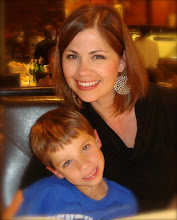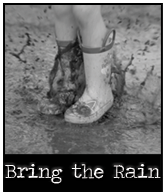
Sunday, April 18, 2010
Let the Meeting Come to Order

Tuesday, April 6, 2010
So I Wrote This Letter

Ben will be three years old on May 8. He is a happy, strong-willed boy who loves dogs, hugs, pretzels, strong wind on his face, his brother (usually), and any toy that involves a ball. He also has a rare neurological condition called periventricular heterotopia and is significantly developmentally delayed in all areas. In addition, as far as we know, his case is unique. We haven’t yet found anyone quite like him. The population of people who have PH is very small, and within that, the population of those who have developmental delays appears to be microscopic.
Ben cannot walk independently but has been scooting around for several months and recently began crawling. He received his own AFOs just one week ago, and these are proving to be helpful. We are hopeful that he will walk, but we realize that it will take a long while and a great deal of hard work before that happens. He does not talk but has consistently said “dog” and “Gon” (John, his brother) for nearly two years, with a few other words that ebb and flow in his usage. He laughs appropriately and heartily, and he sometimes babbles strings of the few sounds he makes. He is learning sign language and has made great strides in his receptive language following the recent insertion of ear tubes, which seem to have relieved the almost constant ear infection/excessive fluid cycle. We are hopeful that an expressive language breakthrough won’t be far behind. Ben still drinks from a bottle, but we are working diligently to have him drink from it independently and to transition to a cup. I think this might take longer than any other milestone. Ben is extremely orally defensive. We were unsuccessful in getting him to eat pureed foods until he was close to a year old. Much of the food he eats now is still pureed, although his excessive gag reflex has subsided and he can now tolerate more texture. Brushing his teeth or administering oral medication is an exercise in patience and is very difficult. Ben’s relative strengths are his strong receptive language skills (for example, following two step instructions such as, “Get the box out and then close the door.”), his problem solving skills, and his fine motor skills.
Ben has benefitted immeasurably from his numerous weekly therapy sessions, including twice-weekly physical therapy, occupational therapy, developmental therapy, speech therapy, and feeding therapy. He has seven weekly appointments, not including specialists, or if someone gets sick and throws off the whole show! Therapy has helped resolve muscle tone issues and torticollis; the resulting plagiocephaly was mostly resolved by use of a Star-band helmet, which he wore for approximately ten months, until he was about 16 months old.
Our greatest concerns for Ben are for his future, obviously, but we feel that there are immediate needs that we must address. His intermittent strabismus seems to have gradually subsided as his entire body has grown more coordinated, but it is still present and noticeable enough to cause a failed vision evaluation with Wake County Preschool Services. Rather than simply continuing to see Ben’s current ophthalmologist, who has never seen a child who has PH, we desperately want to know if there is a pediatric ophthalmologist who might have some experience with another child who has had PH diagnosed as early as Ben. I don’t know if there is anybody out there who meets that qualification, but we are willing to go anywhere to get some answers and to be certain that we don’t pass an ideal window of time to treat whatever causes this, if there is anything that can be treated.
Ben also has frequent episodes of unexplained vomiting. Normally these occur during his naptime, and less frequently while riding in his car seat. We realize that there could be a simple explanation such as reflux, but more than one therapist has expressed doubt that at his age, this could be such a frequent and sometimes huge problem. Ben has had two EEGs and is scheduled for another one in May to coincide with his next neurology appointment. The past results have indicated no seizure activity. Ben has had a complex febrile seizure. We know that seizure activity will occur due to the PH, but that shouldn’t happen until he reaches pre-teen years. We understand that, due to his condition, his threshold for seizure activity is quite possibly lower than the average person’s. We very much want to discover the reason for these episodes and know if we can prevent them.
Of all of the different physicians and therapists who see Ben, we have a wide range of opinions about the size of his head. Only one made his first words to us, “Ben has microcephaly. He will never be normal.” You might imagine how difficult that was to hear when we only went to have genetic testing performed, not to hear a diagnosis. Hearing that, however, led us to question everyone else. So far, although his measurements do not reach that third percentile mark, his head is growing on its own curve. With differing degrees of certainty, the general consensus seems to be that as long as that growth continues and Ben continues to show developmental improvement, then it is too early to diagnose microcephaly versus just having a small head.
I have discovered some research that suggests that people who have PH have an increased risk of sudden cardiovascular problems. Clearly, that is disconcerting information, but I have found that there isn’t much associated research and wonder if I can find more information. If Ben needs a cardiologist, I need to be on top of that.
We decided to search for a new pediatrician for Ben as we have grown increasingly dissatisfied with the care he has received at his current practice. As time passed between visits, we would feel excited about what would be lined up or suggested to us at his next visit. For example, last summer we were promised an appointment with a pediatric ophthalmologist in Atlanta who Ben’s doctor felt had seen patients like him before and would give us valuable insight. After much go-around and communication with the referral nurse, she told us that Ben’s pediatrician informed her that “it probably isn’t going to happen.” He said to her (not to us) that he had a couple of other ideas, but nothing has ever materialized. Meanwhile, we are left without current vision exams, which is not only frustrating because we would like to know more about his vision, but also because this lack of communication has resulted in delaying Ben’s evaluations for preschool services. I don’t know how much of a gap will occur, but I do know that there will be a detrimental lapse in services for Ben as he phases out of the Infant-Toddler program. Follow-through with other issues, big and small, has been lacking to non-existent. While we initially believed that the staff just wasn’t doing anything to help us, we now have reason to believe that the fault lies with Ben’s pediatrician.
Fed up, my husband stayed up late one night and did some research in order to find a new pediatrician for Ben. He discovered your practice’s website and left your profile for me to see. We were thrilled to see that you are so active in the special needs community! We were pleasantly surprised to discover that you are a Lexington native. My husband is from Owensboro; I am from Henderson. We were absolutely elated by the discovery that you are a fellow Transy alum, and we immediately agreed that this was just too good to be true! You can imagine how disappointed we were to finally discover that you aren’t currently accepting new patients.
I hope that you will consider our request and see our son, Ben. We plan to take him to Village Family Care here in Wake Forest for minor illnesses or infections, but we are hopeful that you will see him for his well visits or developmental assessments. We have quite a team of physicians and therapists looking out for Ben, but the missing, crucial component is a very skilled pediatrician who has a passion for developmental issues and special needs children. As Ben’s medical and developmental advocates, we will not rest until we know that we have left no stone unturned in the search to find answers about what will help him most and what we must do to prepare. We do understand that we’re blazing a trail and that answers will be difficult to find as his condition is so rare, but that doesn’t mean they don’t exist. Perhaps we could even be of some assistance or support for some family out there, feeling the same as we did for many months. As Ben’s parents, we desperately want to know that we are giving him every advantage we can find, that we won’t look back ten years from now and wish that we had tried harder or had done more. We hear a lot of “I just don’t know. Come back in six months.” We understand that rare disorders and diseases aren’t that easy to explain, but we are no longer willing to bide our time, and that answer just isn’t good enough any longer.
Thank you for taking the time to read about our son and for considering making room for him at your practice. I have tried to make a very long story medium; numerous other tests and procedures have been performed on Ben, the results of which, when pieced together with what I’ve explained here, I am confident can show us our next step. My husband and I, along with our six-year-old son, John, love Ben to little pieces, and we think that you will, too.
Very gratefully yours,
Allie Sheckels Townsend ‘96
Cleveland S. (Landy) Townsend ‘94
You know, I like to think that it was the careful crafting of this letter that persuaded Dr. Lail to consider making an exception to her No New Patients policy, but if I had to put odds on the reason, I think it was probably the picture of Ben's sweet little face. Heck, she might not even have read it at all!
At this moment, I am waiting for the 5:00 hour, when I am expecting a call from Dr. Lail to discuss our options and learn if she is, indeed, willing to take Ben as a new patient. Fingers crossed.














